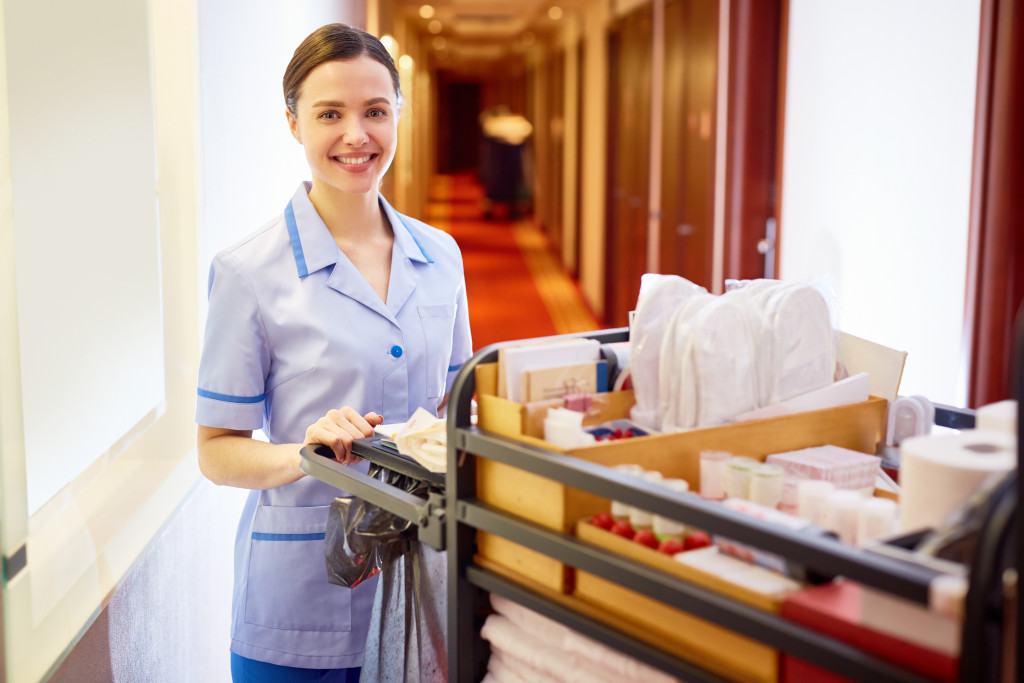It’s no secret that the COVID-19 pandemic is causing a lot of upheaval for businesses worldwide. But what about hotels? How are they coping with the outbreak?
This blog post will look at some technologies hotels use to help them get through this difficult time. From virtual concierges to AI-powered customer service, these accommodations use tools to keep their guests safe and comfortable.
1. Website Upgrade

Hotels are updating their websites to offer more information on the COVID-19 situation. For example, many hotel chains have added FAQ pages about what precautions they’re taking in response to coronavirus concerns, such as sanitizing rooms after each use or providing hand sanitizer at reception desks and other public areas.
Some hotels have also added a link to the CDC’s website at their homepage. This way, guests can read up on what they need to know before booking a stay or traveling anywhere in general right now.
Hotels are providing more information about their COVID-19 response on social media too. Their Facebook pages often include posts that outline how each hotel chain deals with coronavirus concerns, whether by adding hand sanitizer stations or cleaning rooms more often than usual.
They may also post status updates on Twitter to let people know about any changes in policy during this time (e.g., extending stays for those who need it).
Because of the changing policies in quarantine and airport shutdown, some brands are also reaching out to a hotel SEO company to grow their local reach.
2. Virtual Concierge
A virtual concierge is a computer-generated assistant that helps guests with checking in and out, making reservations, and finding information about the hotel.
Many hotels are using virtual concierges through chatbots, which are computer programs that can mimic human conversation. These AI programs can answer simple FAQs (e.g., How far is it from here? What amenities do you offer?), provide directions and other information, and even help guests with special requests (e.g., arranging a room upgrade).
Virtual concierges can also help guests with requests like room service or spa appointments. They can even recommend restaurants or other activities nearby.
Virtual concierges are accessible from a mobile device or computer, and they’re available 24 hours a day to assist guests with their needs. They can also be programmed for multilingual support so that international visitors can access these services.
3. Mobile Check-In and Checkout
Mobile check-in is a technology that allows guests to use their smartphone or tablet as an electronic key when they stay at your hotel.
This technology is convenient for guests because they don’t have to wait in line at the front desk to check in and expose themselves to the virus. They can open an app on their phone, enter their reservation details, and scan their credit card.
After that, they’re free to explore the hotel or head out for the day. When it’s time to return to the hotel, they can use their phone or tablet to unlock their room and head inside.
When they’re ready to go home, they can also use the app to checkout. This process is simple and takes just a few clicks.
4. Automated Cleaning
Automated cleaning is a technology that uses robots or machines to clean hotel rooms, reducing the frequency of contact hotel staff have with guests, which can help prevent the spread of disease.
Some hotels use robots that can disinfect a room with UV light, which kills germs in a few minutes. The robots use sensors to detect where people have been and then aim their lights at those areas.
These machines can also take care of other tasks, such as folding towels and making beds without any human intervention.
Another option is robotic arms that can mop floors or vacuum carpets, again without any contact between hotel staff and guests. This is convenient because it eliminates the need for housekeeping services while also keeping rooms clean when people are more concerned about germs than usual.
5. More Extensive Features on Mobile Apps
Hotel apps are good, but chains have been forced to adopt better technologies quickly because of the pandemic. Hotel apps have come a long way over the last few y. Today, many offer guests more features than ever before on their mobile platforms.
They’re providing things like virtual concierge services and the ability to order room service directly from an app. Others let guests control things like the room temperature and lighting from their phones or tablet.
Hotels can also integrate their mobile apps to other tech solutions like reservation systems and loyalty programs so that guests have easy access to all the information they need while they’re staying at a property.
Hotels can also use mobile apps to collect feedback from guests about their stay. This information can help them improve their services for future guests, and it’s also convenient for travelers looking to share their thoughts after a trip.
With the COVID-19 pandemic, hotels need to find a way to make their guests feel safe and comfortable without compromising the quality of their service and staff health. These technologies are a great way to do that, and they’re likely to become even more popular in the coming months.


